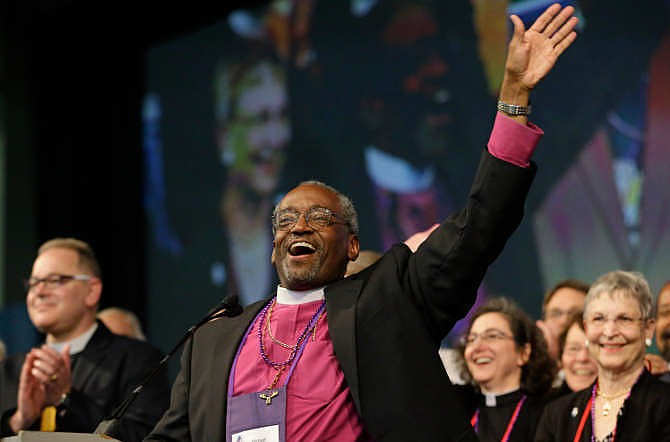SALT LAKE CITY (AP) - The Episcopal Church elected its first African-American presiding bishop, choosing Bishop Michael Curry of North Carolina during the denomination's national assembly Saturday.
Curry was elected in a vote by bishops at the Episcopal General Convention, the top legislative body of the church. Curry won among the bishops in a landslide, earning 121 votes. The other three candidates had 21 votes or less. The decision was affirmed on a vote of 800-12 by the House of Deputies, the voting body of clergy and lay participants at the meeting.
Curry will succeed Presiding Bishop Katharine Jefferts Schori, who will complete her nine-year term on Nov. 1. She was the first female presiding bishop and the first woman to lead an Anglican national church. The New York-based Episcopal Church is the U.S. body of the Anglican Communion, an 80-million member worldwide fellowship of churches with roots in the Church of England.
"We've got a society where there are challenges before us. We know that. And there are crises all around us. And the church has challenges before us," Curry said in brief comments as he was introduced to the assembly as presiding bishop-elect. "We are part of the Jesus movement, and nothing can stop the movement of God's love in this world."
Norberto "Bert" Jones, 65, of Newark, New Jersey, joyously hugged friends after the results were announced, marveling at being alive to see a black U.S. president and black Episcopal presiding bishop.
"This is beautiful," said Jones, a lay deputy and African American. "God works awesome wonders man. We're getting to that point of understanding that it's not about color and culture, but what you bring to the table. "
Curry was elected as the nation is grappling with the aftermath of last week's massacre of nine congregants at a historic black church in Charleston, South Carolina, and amid the Black Lives Matter movement over the deaths of black men in police shootings and in police custody.
The Episcopal Church has been trying to confront its own history of racism. The church has asked dioceses to research their links to slavery and the history of racism. Many early Episcopalians were slaveholders whose donations were used to build churches, cathedrals and schools. In 2008, Jefferts Schori held a national service of repentance to apologize for the church's complicity with slavery, segregation and racism.
Curry, 62, has been bishop of North Carolina since 2000, leading a diocese of 48,000 church members, 112 congregations and a network of ministries. He will now lead a nearly 1.9 million-member denomination known for its history as the faith home of many of the Founding Fathers and U.S. presidents.
A Chicago native who has two daughters with his wife, Sharon, Curry grew up in Buffalo, New York, and graduated from Hobart College and Yale Divinity School. He was ordained as a priest in North Carolina, leading parishes there and in Ohio. He then served for 12 years at St. James Church in Baltimore, Maryland, which was established in 1824 as the third black Episcopal congregation in the U.S.
Curry is known for his emphasis on evangelism, public service and social justice.
Author of "Crazy Christians: A Call to Follow Jesus," he has said he prays "for a church passionately committed to making disciples."
"At a deep level I am suggesting a church-wide spiritual revival of the Christian faith in the Episcopal way of being disciples of Jesus," Curry said in the church materials introducing the candidates.
He takes charge at a time when fewer Americans are formally affiliating with a particular religious group, contributing to steady membership declines in the Episcopal Church and other liberal Protestant groups, as well as some conservative churches.
Membership in the Episcopal Church has dropped by 18 percent over the last decade. Next week, the General Convention will consider restructuring church bodies and redirecting spending to more effectively reach out to the public.
Curry supports gay rights, speaking against North Carolina's 2012 constitutional amendment that banned same-sex marriage, which is now invalid, and allowing same-sex church weddings in the North Carolina diocese. The denomination has emerged from a period of turmoil after the 2003 election of Bishop Gene Robinson, the first openly gay bishop in the Anglican Communion. Many Episcopal conservatives left or distanced themselves from the national church after his election.
Next week, the convention will vote on eliminating gender-specific language from church laws on marriage so religious weddings can also be performed for same-sex couples. Clergy could decline to perform the ceremonies. Right now, each bishop decides whether his or her priests may conduct gay marriages.
McCombs reported from Salt Lake City. AP Religion Writer Rachel Zoll reported from New York.

